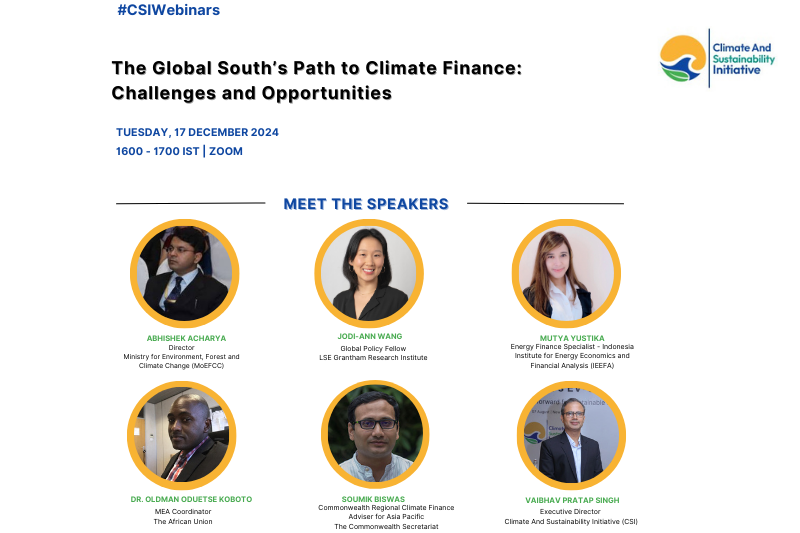The Climate & Sustainability Initiative (CSI Global) hosted a thought-provoking webinar titled “The Global South’s Path to Climate Finance: Challenges and Opportunities,” gathering experts and policymakers to discuss the disparities, challenges, and actionable solutions in accessing climate finance.
Agenda Overview
As nations grapple with disparities in climate finance, the webinar explored critical themes such as the evolving dynamics between the Global North and South, mechanisms for equitable funding, and preparations for COP30 in Brazil. The key focus areas included:
1. Process: Addressing concerns over COP29’s business processes and ensuring fair representation in negotiations.
2. Instruments: Evaluating the suitability of financial mechanisms—grants vs. loans, public vs. private.
3. Equity in Climate Finance: Strategies for equitable distribution, policy support, and capacity-building initiatives.
Esteemed Panelists
The webinar featured distinguished speakers who brought diverse perspectives from across the globe:
Abhishek Acharya: Director, Ministry for Environment, Forest and Climate Change (MoEFCC), India, and a leading figure in climate finance policy and international negotiations
Jodi-Ann Wang: Global Policy Fellow, LSE Grantham Research Institute, and a PhD candidate focusing on justice in climate policies
Mutya Yustika: Energy Finance Specialist, Indonesia, with expertise in renewable energy economics and financing
Dr. Oldman Oduetse Koboto: MEA Coordinator, The African Union, renowned for his expertise in development and environmental legal frameworks
Soumik Biswas: Commonwealth Regional Climate Finance Adviser for the Asia Pacific, Commonwealth Secretariat, a veteran in climate finance strategy and governance
Key Insights
1. Bridging Africa’s Climate Finance Gap
Africa’s need for $1.3 trillion to tackle climate challenges stands in stark contrast to the 3-4% of global climate finance it currently receives. Dr. Koboto highlighted structural barriers, including limited institutional accreditation, and called for region-specific mechanisms to improve accessibility.
2. Reassessing Climate Finance Commitments: India’s Standpoint
Mr. Acharya underscored the inadequacy of the $300 billion global commitment compared to the $5-6 trillion required by developing countries by 2030. He stressed the urgent need for new and additional finance, as outlined in international agreements, to support ambitious climate action.
3. Addressing Vulnerabilities in Small Island Developing States (SIDS)
With only 1% of climate finance reaching SIDS, Mr. Biswas emphasized the pressing needs of Pacific island nations and called for tailored support mechanisms to strengthen their resilience.
4. Scaling Up Energy Transition Funding in Indonesia
Ms. Yustika shared Indonesia’s challenges in achieving its Just Energy Transition Partnership (JETP) goals. The current commitment of $20 billion falls drastically short of the $97.1 billion required by 2030, highlighting the need for more substantial grant-based funding.
5. Integrating Equity and Justice into Climate Finance Frameworks
Jodi-Ann Wang advocated for greater transparency and accountability in climate finance flows. She stressed that justice and equity must be embedded into financial mechanisms to ensure that vulnerable regions receive appropriate support.
Actionable Recommendations
1. Establishing Regional Climate Finance Mechanisms for Africa
Dr. Koboto proposed hosting an African Climate Summit in 2025 to create an African Resilience and Transformation Fund, addressing the continent’s unique challenges.
2. Reviving Long-Term Climate Finance Discussions
Mr. Acharya recommended reinvigorating the UNFCCC’s long-term finance discussions to secure adequate commitments and better define financial obligations under international frameworks.
3. Enhancing Support for Small Island Nations through South-South Collaboration
Mr. Biswas called for stronger partnerships among Global South nations to bolster the representation of SIDS in global negotiations and ensure fairer financial flows to vulnerable communities.
4. Increasing Climate Finance Commitments for Energy Transitions
Ms. Yustika highlighted the need to scale annual funding commitments to $1 trillion globally, with a significant shift toward grants and concessional finance to support ambitious energy transitions.
5. Crafting a Collaborative Roadmap for COP30
Jodi-Ann Wang proposed developing a coordinated action plan leading up to COP30, focusing on integrity and accountability in delivering climate finance to the Global South.

